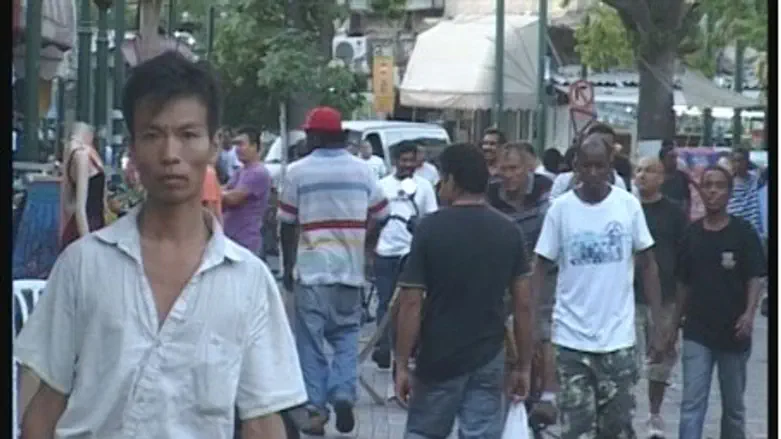
Arutz Sheva visited the neighborhoods of southern Tel Aviv, in order to hear from local residents who are facing ongoing problems caused by infiltrators from Eritrea and Sudan.
The residents said they were scared to leave their homes and even walk on the streets for fear of being attacked by the many infiltrators on the streets.
“There are residents here who have been suffering for more than three years and nobody cares,” said Dror Kahalani, a resident of the Hatikva neighborhood in Tel Aviv, where about 10,000 people gathered last week to protest the presence of infiltrators.
“The residents are suffering daily, hourly, at each moment,” stressed Kahalani, who was on the verge of tears. “We’ve warned about it and are warning about it, and we’re even shouting for help. You can see it on Facebook, and everywhere. The residents of southern Tel Aviv are shouting for help. I warned the government and said that we are in real danger.”
“Let me give you an example of the suffering,” he said. “It was Erev Shavuot and I was walking to the synagogue, and I was scared. My family usually ensures that there is food in the synagogue and I have to carry this food five or six times back and forth. I was walking in fear. On the way I came across a group of Sudanese and I moved to the other side of the street. The second time I came across a drunken Eritrean with his pants open. I was scared of him so I moved to the other side. I’m scared in my own home. People live here in true fear.”
Arutz Sheva also visited the Neve Shaanan neighborhood, near the Central Bus Station in southern Tel Aviv. Because so many infiltrators have ended up in the neighborhood, the area looks surrealistically like an African country, in terms of population, stores and atmosphere.
A, an Arab who lives in the neighborhood and who asked not to reveal his name or face, said, “A few times Arab Israelis came to the Neve Shaanan area to take pictures. Most of them were beaten, their cameras were stolen, their cellphones were broken.”
He added, “About a week or ten days ago, Sudanese people were stabbing one another. I tried to take a picture of them with my iPhone and I was attacked. There was a Filipino woman with an iPhone standing next to me. They forcefully took her iPhone and broke it in front of some cops.”
“They are not deterred by statements from officials,” said A. “Now they riot even more. They understood long ago that no one can go near them, especially after what is heard and seen in the media, that there is no law that can control the infiltrators. The Interior Minister and the Prime Minister say that we can’t expel them, and that gives them greater power. The police do a good job but it doesn’t deter anyone. They’re not afraid. They know that the cop takes the person to the station and he is released a few minutes later, then he hits the streets again and is even worse than before because he understands that the police can’t do anything to him.
A lives near two Holocaust survivors, who he said “are scared to talk with anyone, they barely leave their homes, just to buy a few things and then come back, and we rarely see them, because some Eritreans attacked them in the building several times.”
He said, “As a non-Jew, I can tell you that I’m ashamed of the Jewish State. If after the State was established a couple of Holocaust survivors can’t leave their apartment because of strangers or infiltrators or whatever you call them, if they’ve reached a point where they can’t leave the building... There was also a synagogue near the building and it closed down because an Eritrean club opened next door. Put the two together, Holocaust survivors and a synagogue have to disconnect within the Jewish State – it’s very difficult. No one should accept that.”